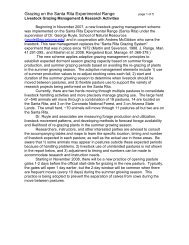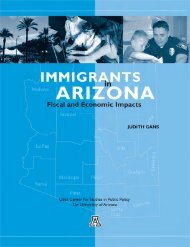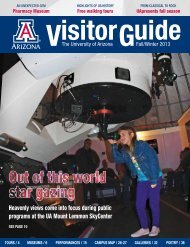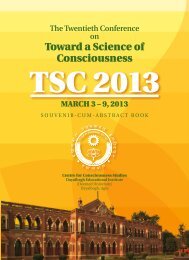CONSCIOUSNESS
Download - Center for Consciousness Studies - University of Arizona
Download - Center for Consciousness Studies - University of Arizona
- No tags were found...
Create successful ePaper yourself
Turn your PDF publications into a flip-book with our unique Google optimized e-Paper software.
1. Philosophy 85<br />
its properties, any more than a mental process can be the same thing as a physical process,<br />
only without the physical stuff. The reductive representationalist is guilty of advancing an<br />
absurd Paraphenomenal Hypothesis. C1<br />
90 When are the Contents of Experience Mulitmodal? Susanna Siegel<br />
(Philosophy, Harvard University, Cambridge, MA)<br />
Suppose you carefully unzip a pouch, watching your hand as it pulls open the zipper. Since<br />
you can both see and feel the unzipping, it is natural to think of your experience as jointly<br />
visual and kinesthetic. But what about its contents? In what sense, if any, does your experience<br />
have distinctly visual and distinctly kinesthetic contents? I discuss a new argument that some<br />
contents are irreducibly multimodal. C16<br />
91 Conceptualism and the Richness of Perceptual Content John Spackman<br />
(Philosophy Department, Middlebury College, Middlebury, VT)<br />
This paper presents an argument for conceptualism about conscious human perceptual<br />
experience, the view that the conscious contents of human perception are similar in kind to<br />
belief contents in being constituted by concepts. There has recently been what might be seen<br />
as a second wave of arguments for nonconceptualism, arguments for what has sometimes<br />
been called content nonconceptualism as opposed to state nonconceptualism. State nonconceptualism<br />
is the view that it is not necessary, in order for a subject to have a given perceptual<br />
experience, that she possess the concepts used in a canonical account of it. Content nonconceptualism,<br />
on the other hand, holds that perceptual content is nonconceptual just in case it is<br />
different in kind from belief contents, in that it is not constituted by concepts. Proponents of<br />
content nonconceptualism such as Michael Tye and Richard Heck have suggested, rightly I<br />
think, that even if state nonconceptualism is true, this does not establish content nonconceptualsm,<br />
and they have thus offered stronger arguments to show that in fact perceptual contents<br />
are not constituted by concepts. I argue, however, that the conscious perceptual content of<br />
adult humans, at any rate, is constituted by concepts in the sense that its nature is determined<br />
by them. My argument has the following form: 1. It is a necessary condition of an item being<br />
a constituent in the conscious content of a given perceptual experience that the subject recognize<br />
it as a token of some type. 2. If a subject recognizes an item of perceptual experience as<br />
a token of some type, and perhaps satisfies certain other general conditions on concept possession,<br />
she satisfies the minimal conditions on possessing a concept of that type. 3. The kind<br />
of content which any conscious perceptual state has is determined by concepts possessed by<br />
the subject. 4. Content conceptualism is true of conscious perceptual content. My support for<br />
the first premise derives from considerations of the richness of perceptual experience, and in<br />
particular of studies of change blindness and inattentional blindness. I argue for a middle path<br />
in the interpretation of such studies, between those such as Alva Noe and Kevin O’Regan who<br />
view them as showing that visual experience is much less rich than we suppose, and those like<br />
Michael Tye, who take them to show only that subjects’ memory of the detailed content of<br />
their experience is of limited duration. What the studies show, I suggest, is that it is a necessary<br />
condition of an item belonging to conscious perceptual content that the subject recognize<br />
it as a token of some type, however general. Finally, I maintain that what this conception of<br />
perceptual content supports is not just state conceptualism but content conceptualism. On this<br />
view, concepts are not merely correlated with conscious perceptual content. Concepts determine<br />
the nature of that content, for it is part of the nature of the constituents of such content<br />
that subjects’ recognize them as tokens of some type, and this is precisely to possess concepts<br />
of them. C1<br />
92 What Role for the Brain in Vehicle-Externalist Theories of Perceptual<br />
Experience? Pierre Steiner (Compiegne University of Technology,<br />
Compiegne, France)<br />
Up to now, a crucial flaw of recent vehicle-externalist or enactive theories of (qualitative)<br />
perceptual experience (Noe 2004, 2009; Hurley, 1998; O’Regan and Noe, 2001) is their<br />
inability to provide a clear account of what the brain is specifically doing when perceptual







